Huwa: From a WhatsApp group to sharing Palestinian olive oil with the world
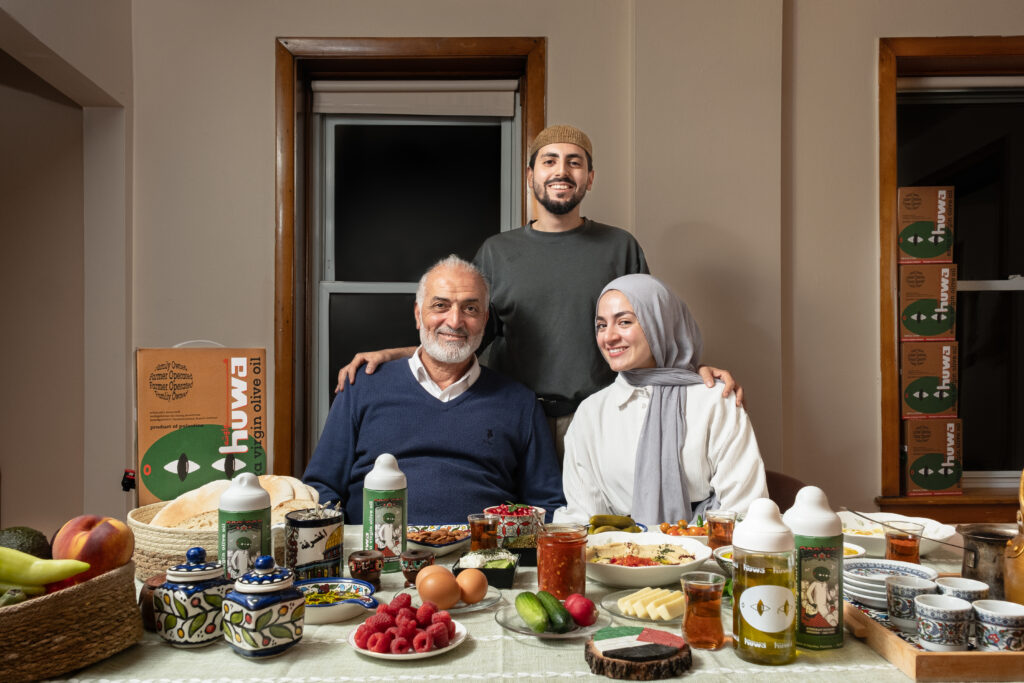 From left: Omar Saleh Huwaoushi, Bilal Othman Huwaoushi and Maryam Othman Huwaoushi. For the family, Huwa is not just a business - it's a legacy. Credit: Diane Sooyeon Kang
From left: Omar Saleh Huwaoushi, Bilal Othman Huwaoushi and Maryam Othman Huwaoushi. For the family, Huwa is not just a business - it's a legacy. Credit: Diane Sooyeon Kang
Diane Sooyeon Kang is a food and travel photographer and writer with a passion for storytelling. She has traveled the world extensively, working with esteemed publications and brands. You can find more of her work at dianeskang.com.
A vibrant spread adorns an overflowing table, filled with precious hand-painted ceramics from Palestine, hummus, yogurt dips, za'atar, and fresh tomatoes and mint picked from the backyard garden. Copious amounts of olive oil fill several bowls and are drizzled over nearly every dish. Tucked between the plates are olive oil squeeze bottles adorned with playful illustrations and stickers.
The olive oil, with a surprisingly fruity yet peppery kick, is none other than Huwa, the Huwaoushi family's newly launched product, made from handpicked, cold-pressed olives straight from a family-owned olive grove.
We didn't want to take ourselves too seriously when making the packaging. Olive oil production, especially in Palestine, has never been a purely serious or somber activity," shares Bilal Othman Huwaoushi, one of three Huwaoushi siblings involved in creating Huwa. It's about families coming together - kids playing, aunts and uncles gathering to pick olives." This sense of joyful community is mirrored in the brand's design, which includes playful illustrations of birds, a reference to Palestinian symbols, and even comic-style artwork on the inside sleeve.
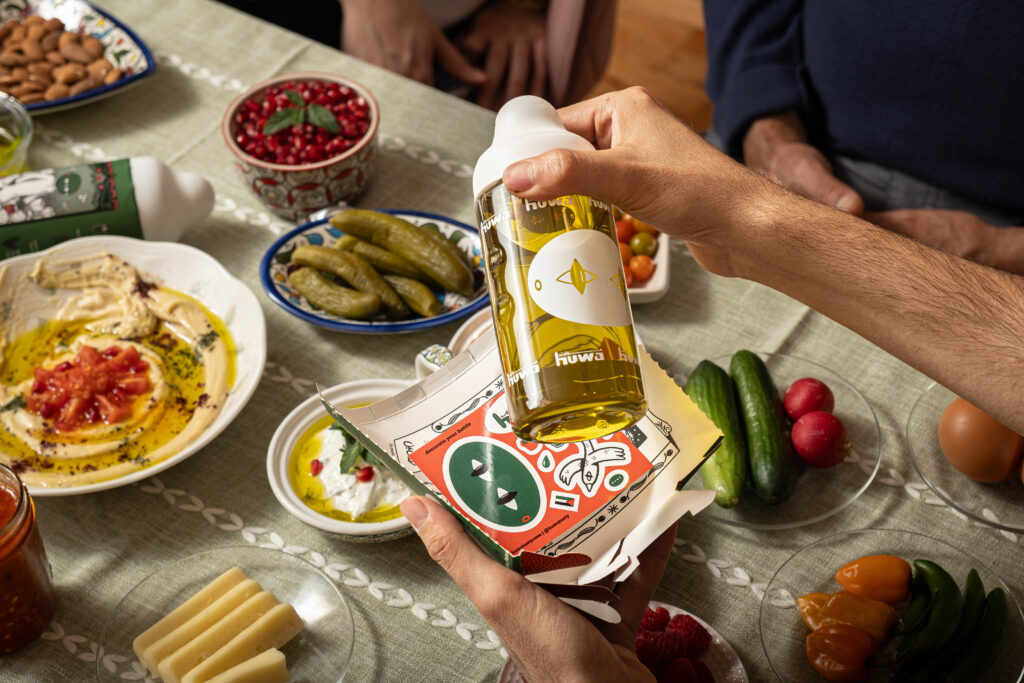 Credit: Diane Sooyeon Kang
Credit: Diane Sooyeon KangFor generations, Bilal's family has been farming olives in Palestine. This deep-rooted tradition is evident in how the family talks about their land, which has produced olives for as long as they can remember. The same trees we eat from are the ones my grandfather planted as a kid," Bilal shares, recounting the heritage of their olive groves and the rare, age-old practices that make their olive oil unique.
When Bilal's father, Omar Saleh Huwaoushi, a retired cab driver, immigrated to Chicago in the 1980s, he missed the flavors of home, especially the olive oil he grew up with. Unable to find anything like it, he started bringing it back with him. Our family has been growing olives for centuries, but we're the first generation to bring this olive oil to the U.S.," Bilal states. Once their friends got a taste of the oil, they wanted it too. And from there, it took on a life of its own.
As a lower-income family, everyone worked together to build the olive oil side business. Before Huwa was created, the Huwaoushis sold their olive oil in 17-liter tanks through a WhatsApp group chat. Feedback was overwhelmingly positive. People were telling us this was some of the best oil they'd ever tasted," Bilal recalls. Since the oil came directly from their uncle's farm, they were able to offer a premium product at a fraction of the price compared to other premium olive oil brands.
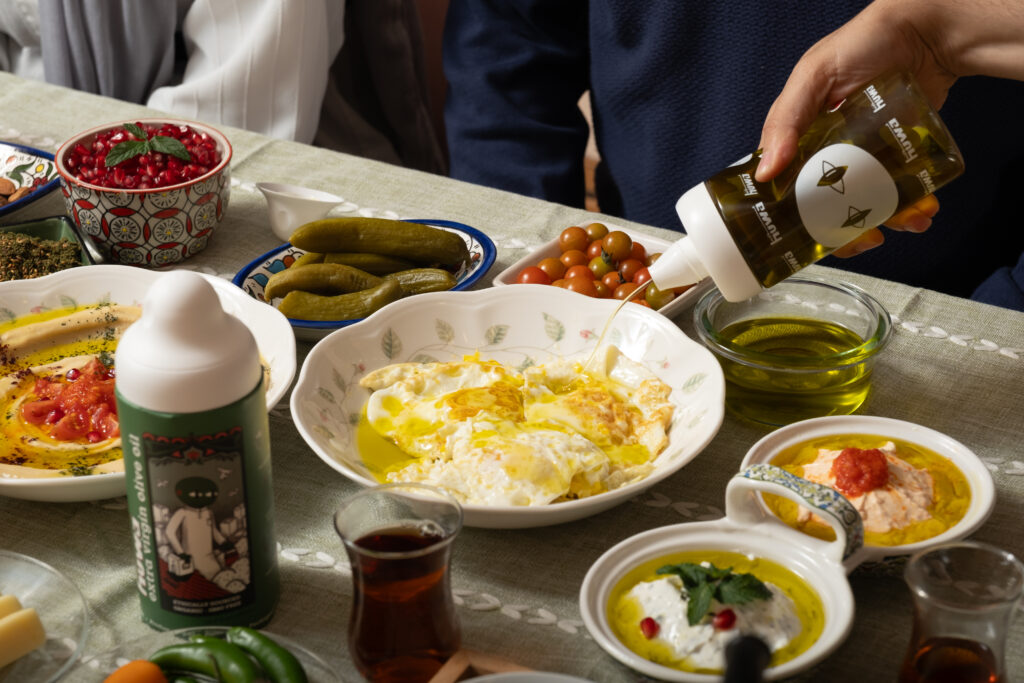 Credit: Diane Sooyeon Kang
Credit: Diane Sooyeon KangThrough its popularity in WhatsApp groups, Bilal saw an opportunity, and they decided to brand it as Huwa. It became a passion project to share his Palestinian heritage with a larger audience and create something meaningful with his immediate and extended family, and for the people in his village.
The olive oil is deeply interwoven with the story of their town called Aqraba, a close-knit village where people remain tightly connected even across generations and continents. As Omar shares, If you mention my name in the village, everyone knows my family. Even after 40 years abroad, returning feels like I never left." With over 600 family members across multiple generations, the legacy of togetherness is alive and well, both within the family and in their interactions with the community back home.
Their heritage is celebrated each olive harvest season, when family and friends come together to enjoy freshly pressed oil, often with simple dishes like bread soaked in olive oil with onions and sumac. This ritual, as they explain, is not just a meal; it's an expression of gratitude for the harvest, a way to reconnect with the land and with each other. In the winter, we'd bake bread, soak it in olive oil, and sprinkle it with sumac and chicken - it's such a simple meal, but it brings everyone together."
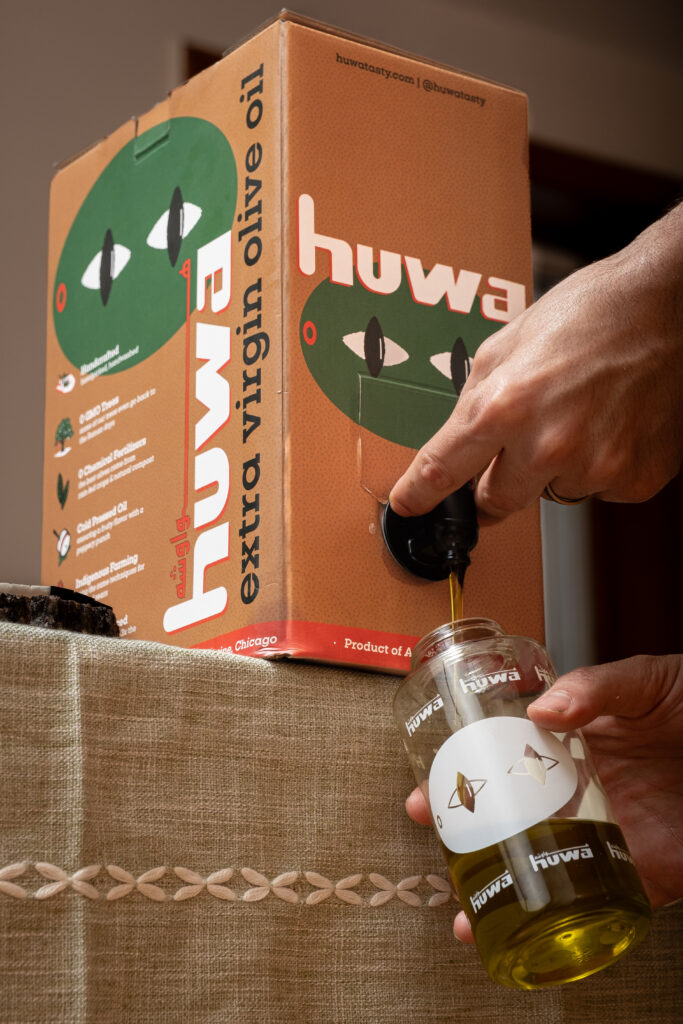 Credit: Diane Sooyeon Kang
Credit: Diane Sooyeon KangUnlike modern olive harvesting practices that often use pesticides, chemical fertilizers, or pest prevention methods like wrapping trees in plastic, Palestinian farmers rely on multi-generational techniques and agricultural wisdom. Farmers plant fig trees within olive groves to naturally attract pests away from the olive trees, and fertilize the soil only with compost and rely solely on rainfall for irrigation - this preserves soil purity and yields high-quality oil.
The entire production process is very unique - from the way we handle the soil to how we cold-press the oil," Bilal says. While many cultures are defined by their food, our culture is unique in that it's defined by the food process itself."
To produce most commercial-grade olive oil, large machines typically shake trees, disrupting the birds inhabiting the trees and causing unripened olives, branches and leaves to fall and get processed together. In contrast, Huwa uses a gentler method: Workers lean ladders against the trees and hand-pick only ripe olives, enhancing both oil quality and ecosystem balance. These are indigenous Aqrabawi practices honed over a thousand years of farming.
The community mill used for pressing ensures fair compensation for everyone involved in the harvest. Olives are cold-pressed at low temperatures, preserving nutrients and enhancing flavor.
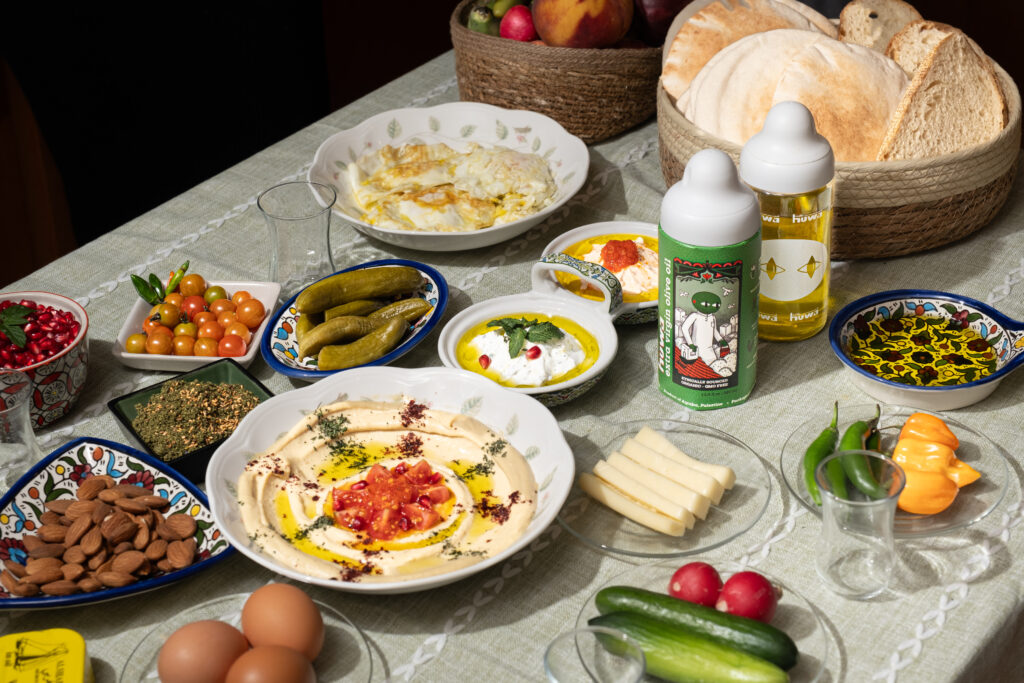 Credit: Diane Sooyeon Kang
Credit: Diane Sooyeon KangFor Bilal's family, Huwa is not just a business - it's a legacy. Their uncle, deeply respected in the community for his agricultural knowledge, serves as a critical cornerstone and is one of many keepers of this tradition. Preserving culture, heritage and knowledge is central to Huwa's mission.
In many ways, Huwa represents a bridge: one that connects Palestinian culture with the American community and preserves an ancient tradition in a modern world. As Huwa continues to grow, the family's goal is to uphold their heritage while inviting others to experience it through the taste of their olive oil.
The entire process has been pretty joyful, but there are so many things that have to be done," Bilal said. Content and copywriting have been challenging, so using AI tools has been helpful in that regard. I'd much rather spend that time on the street, having people sample our oil."
Like many entrepreneurs, Bilal has found that with the support of new technology and tools, tasks that were once time-consuming and tedious have become easier and quicker to complete. Yet, despite the workload, the business's guiding purpose remains unchanged.
I think the nice thing about working with your family is that sometimes we decide to just hang out and other times we keep going," Bilal said. At the end of the day, the KPI [key performance indicator] for whether we succeed is whether we're enjoying each other's company - that's the guiding principle of how we like to run the business."
Chicago's small business owners are shaping their communities with purpose. In this series, we highlight the entrepreneurs behind local gems - each of them building something bigger than just a business. Through Solo, Mozilla's free AI-powered website creator, they're exploring new corners of their community online. Check out Huwa's Solo website here.
 Ready to start creating? Launch your website
Ready to start creating? Launch your website The post Huwa: From a WhatsApp group to sharing Palestinian olive oil with the world appeared first on The Mozilla Blog.